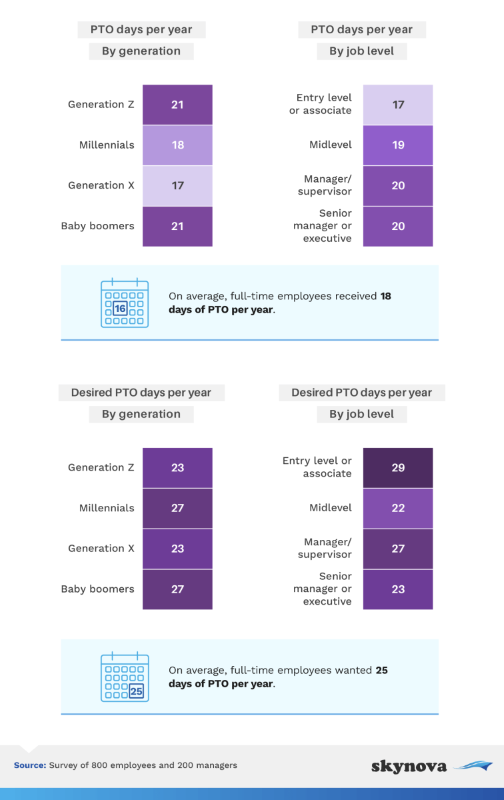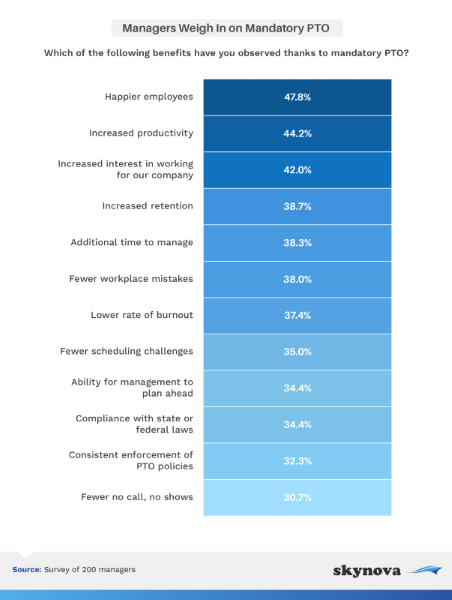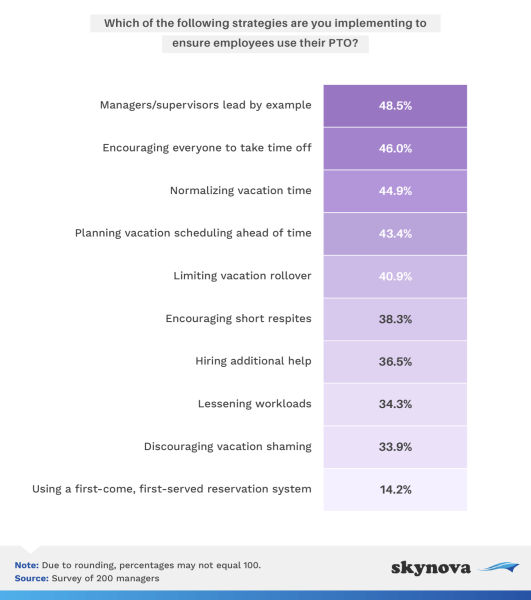How mandatory PTO policies affect employee happiness
Skynova’s survey asks employees and managers to evaluate existing paid time off offerings, how successful they are and what changes should occur.

A recent study from Skynova, an online invoicing and accounting company, identifies a contradiction in how employees view taking time off: On average, full-time employees would like an additional seven days of paid time off per year than they currently receive but almost one in five respondents report avoiding taking time off due to having too much work or feeling unsupported by their employer.
Skynova’s survey received responses from 800 employees and 200 managers about their organization’s PTO policies and its impacts on their overall wellness. The results show that 89.9% of respondents’ time-off policy is a set number of days per year, while 10.1% have unlimited PTO.
On average, the study reports full-time employees receive 18 days of PTO per year, yet they would like to have 25 days of PTO per year. The desire for more time off was highest among millennials and baby boomers as well as among those at entry or associate level and the manager or supervisor level.

Having PTO available and using it are different things, and the study reports almost 31.9% of employees “often” avoid taking time off because they feel unable to do so — another 32% “sometimes” avoid it and another 19.8% “always” do.
Happier and more productive employees
According to the survey, 70.5% of respondents’ employers have a mandatory PTO policy, which requires employees to use a certain amount of PTO. However, enforcement of such a policy seems to be lacking, as eight out of 10 employee respondents would like to see companies with mandatory PTO administer it.
When it is enforced, more than two-thirds of employee respondents whose employers have a mandatory PTO policy rate their at-work happiness as “good” or “excellent,” compared to 54.5% of employees without it. The survey also found that employees with mandatory time off were more likely to rate their mental health as “good” or “excellent.”
The survey of 200 managers around the impacts of mandatory PTO policies noted upticks in employee happiness (47.8%) and productivity (44.2%).

Managers weigh in
Other manger perspectives in Skynova’s survey include that 76.4% agree that changing their company’s PTO policy may help retain more employees, and 38.5% indicated that their company already increased PTO in the past year.
Manager respondents report employing a host of strategies to encourage employees to use their time off. The top strategy at 48.5% is managers or supervisors leading by example, followed at 46% by encouraging everyone to take time off.

Overall, this survey suggests that employees who use their PTO are happier and experience better mental health, but they may need to be pushed into doing so by managers or mandatory policies. That said, employees’ concerns about having too much work or lack of team support are not resolved by requiring employees to take time off, though managers’ strategies to hire additional help (36.5%) and lessen workloads (34.3%) could be steps in that direction.
What are you doing, readers, to support your employees to use their PTO? Let us know.
Could unlimited PTO be right for your organization? Here are 10 essential factors to assess.
COMMENT
Ragan.com Daily Headlines
RECOMMENDED READING
Tags: employee benefits, mandatory PTO, mental health, paid time off, Skynova






